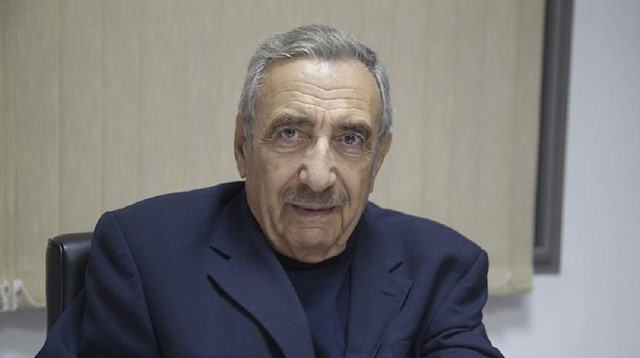

Munir Shafiq, a prominent Palestinian intellectual.
Political ideologies reflect power, influence of states that embrace them, Palestinian intellectual tells Anadolu Agency
The West in general and the U.S. in particular appear to have lost their control over world affairs, Munir Shafiq, a prominent Palestinian intellectual, said in an exclusive interview with Anadolu Agency.
"Western democratic thought is on the wane, even from the inside [i.e., inside western states],” Shafiq said.
He attributes the phenomenon to the rise of “extremist and nationalist groups” in the West -- a trend that he believes constitutes “a blow to democracy”.
“The world is now in the throes of ideological chaos,” the intellectual said.
“In the past, political discourse -- ideas and principles -- was an extension of the economic, military and political control exercised by certain states,” Shafiq explained.
"For example, after the Ottoman Empire fell, Islamic thought fell into decline,” he said. “And during the Cold War, the world was divided between western political ideologies and communism.”
“But ideologies never die, they just lie dormant,” he added. “Ideologies depend on the relative power of their patron states to grow strong.”
Islamic thought on defensive
Today, Shafiq contends, Islamic thought has been “badly bruised” by the recent emergence of extremist groups in the region, “such as Daesh and the Al-Nusra Front”.
Such groups have had a “profoundly negative” impact on the Islamic world, Shafiq said, going on to state his belief that these groups “have been used by the West to weaken and degrade Islamic thought”.
"Nevertheless, Islamic thought will remain influential… and will even continue to grow,” he added, “but its relative growth will remain conditional on the power and influence wielded by Muslim countries.”
“Even when Islam was very weak, Muslim thought was nevertheless able to spread, especially in West Africa,” Shafiq pointed out. “The power of an ideology reflects the sovereignty and power of the states that embrace it."
He added: “Today’s youth are faced with a broken left-wing ideology, an Islamic ideology associated with a region battered by conflict, and a democratic ideology that looks increasingly shaky.”
Such ideological bedlam, Shafiq believes, “has prompted the new generation to eschew ideology and engage in purely practical [i.e., non-political] activities”.
“The communist ideology collapsed following the demise of the Soviet Union,” he said. “And now the liberal ideology that opposed communism is collapsing as well.”
Killing of Khashoggi
Speaking on the last month's murder of Saudi journalist Jamal Khashoggi in the Saudi consulate in Istanbul, Shafiq said: "I think they [the Saudi leadership] wanted to interrogate him before eliminating him entirely.”
"Khashoggi’s murder reveals how out-of-control the world has become,” he added. “That’s why the issue has received so much global attention; it shows how the whole world is now living in chaos”.
A frequent contributor to The Washington Post, Khashoggi went missing on Oct. 2 after entering the Saudi consulate in Istanbul.
After initially denying any knowledge of the journalist’s death, the Saudi authorities later admitted that Khashoggi had in fact been killed in the consulate, albeit by rogue Saudi agents.
Palestine issue
On the thorny issue of “reconciliation” between rival Palestinian factions Hamas and Fatah, Shafiq again cited the ideological factor.
"In the Palestinian political arena, there are two diametrically opposed points-of-view and two competing strategies,” he said.
"One strategy believes that good relations with Washington and negotiations with Israel -- and an eventual peace settlement -- are the best solution [to the Israel/Palestine conflict],” he said.
“This strategy is espoused by the Ramallah-based Palestinian Authority (PA) led by President Mahmoud Abbas,” he added.
“Then there is the opposing point-of-view embraced by resistance groups [led by Hamas], which reject negotiations with Israel and which believe armed resistance constitutes the only viable means of liberating Palestine,” Shafiq said.
“Since these two ideologies are fundamentally opposed to each other,” he added, “reconciliation [between Hamas and Fatah] can only be achieved if Abbas radically alters his policy.”
Referring to the PA’s ongoing failure to achieve any tangible gains for the Palestinian national cause, Shafiq asserted: “The Palestinian resistance will never adopt a policy that so obviously cannot bear any fruit.”
"But Abbas is very stubborn,” he said. “He has yet to recognize the failure of his choice [to enter negotiations with Israel].”
Arab Spring
Regarding the series of popular uprisings that shook the Arab world in 2011, Shafiq said: “The Arab Spring didn’t come out of nowhere. Rather, it reflected the weakness of U.S. regional hegemony and the changing balance of power among world powers.”
“The results of the Arab Spring have been overwhelmingly negative,” he concluded. “If a fresh wave of popular uprisings occurs, the region must learn from its past mistakes and experiences.”
#Arab revolutions
#Islamic thought
#Palestinian
#reconciliation
#Munir Shafiq









